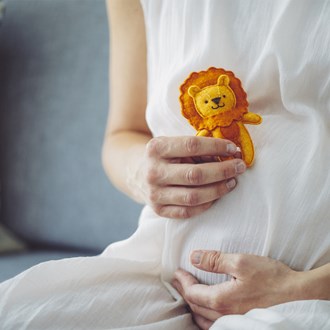When does morning sickness start?

When will morning sickness kick in and what does it feel like?
By Frances Sheen
November 16 2018
When does morning sickness in pregnancy start?
Morning sickness usually starts around week six of pregnancy in the first trimester and will last until around week 14. Symptoms, and the length of time the nausea and vomiting lasts, varies for each woman but it's usually feeling nausea or having a combination of nausea and vomiting.
How early does morning sickness start?
Morning sickness can be one of the early signs of pregnancy. However, not every woman experiences it, and if you don’t get any morning sickness at all, it isn't unusual or a bad sign.
Symptoms vary in every woman but mums-to-be usually feel the first symptoms of morning sickness at around six weeks pregnant in the first trimester of their pregnancy. Some women say they feel queasy as early as four weeks pregnant. It’s at this point that the pregnancy hormones your body produces increase and they start to have an effect on how you feel.
At six weeks pregnant, this might be the first sign you are having a baby, and even though it is called morning sickness, you don’t necessarily feel sickness or nausea in the morning. It can happen at any point during the day and you may not even vomit at all.
However, doctors says you are more likely to feel sick in the morning because you’ll have an empty stomach so it’s usually helpful to try and eat something small and bland as soon as you wake up to ease the symptoms. Try dry toast or biscuits to help relieve the symptoms of morning sickness.
It is unlikely that you’ll feel morning sickness in the first week of pregnancy and the nausea and vomiting will probably peak between weeks eight and 12.
Is it a problem if I don’t get morning sickness?
Not usually, no. About half of pregnant women never get morning sickness and have healthy, straightforward pregnancies.
If you haven't had any symptoms of morning sickness from around the six or eight week of pregnancy mark, it’s possible you won’t experience them at all.
Around half of pregnant women will have both vomiting and nausea, and around 3 out of 10 will just experience the nausea without the vomiting. Other symptoms can include fatigue, dizziness, a general feeling of malaise and feeling sea sick.
Not every woman experiences morning sickness, and it’s nothing to be concerned about if you don’t.
How do I know if my morning sickness is normal?
Most mums-to-be will feel nausea, sickness and experience vomiting that is unpleasant but they can manage it on a day-to-day level.
Many find it’s good to eat small meals regularly to help with the symptoms. Carrying a small packet of biscuits to eat when you start to feel unwell can really help.
However for some, morning sickness can be so severe it can require medical attention. If it is excessive, and you are unable to keep down any food or drink at all, you lose weight, you struggle to work or even to get out of bed, it is called Hyperemesis Gravidarum.
The reasons for this severe morning sickness can vary. For some mums it is just a condition they experience with one or every pregnancy and it can last a short amount of time or throughout their whole pregnancy. It may even be hereditary.
Others might experience it they're expecting twins and hormone levels are higher than when you’re expecting a single baby.
If you feel that your morning sickness is severe, you should see your GP or healthcare practitioner as soon as you can. It may be necessary to have a hospital visit to re-hydrate you or you might need anti-nausea medication and treatment.
It’s important to note that your un-born baby is unlikely to be in any danger from excessive morning sickness.

Getty













